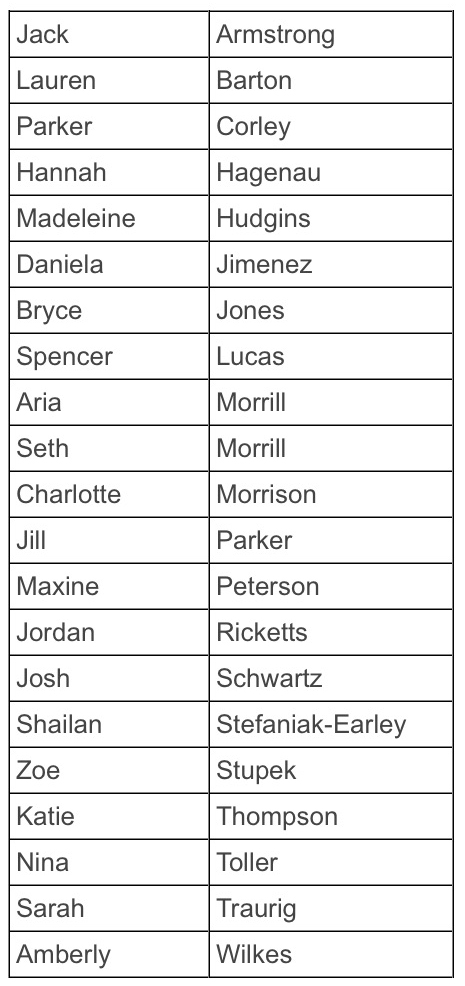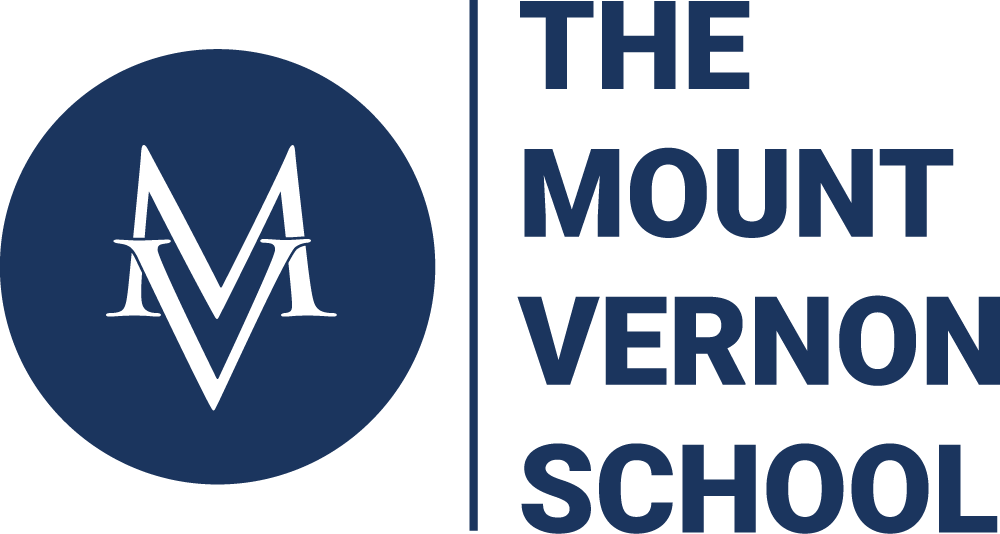 The tenth installment of the Equites Chapter of Mount Vernon’s National Honor Society recently took place.
The tenth installment of the Equites Chapter of Mount Vernon’s National Honor Society recently took place.
By candlelight, 21 students and one faculty member were inducted in the Lightbox. Rich with ceremony, the event was hosted by NHS Adviser Erin McCubbin. In front of their parents, the inductees were welcomed, prayed over and encouraged to continue their good work as strong, service-oriented students and solid community leaders.
The National Honor Society (NHS) is the nation’s premier organization established to recognize outstanding high school students. More than just an honor roll, NHS serves to honor those students who have demonstrated excellence in the areas of scholarship, leadership, service, and character. These characteristics have been associated with membership in the organization since its beginning in 1921.
Each new member was called by name to receive a personalized certificate and membership card, sign the NHS Registry Book, and individually be pinned before reciting the National Honor Society Pledge:
I pledge to maintain high scholastic standing, to hold as fundamental and worthy an untarnished character, to endeavor intelligently and courageously to be a leader, and to give of myself freely in service to others. In so doing, I shall prove myself worthy of a place in the National Honor Society.
Gary Piligian, Upper School math teacher, coach and mentor, was asked to speak at the ceremony prior to being pinned, himself, as an Honorary Member of the Equites Chapter. Mr. Piligian shared wise words with the students and their parents:
 Welcome students, parents, and friends. I would like to thank the current members of the National Honor Society for asking me to address you at this morning’s induction ceremony. We are here to celebrate the 21 new inductees this morning, and I offer my congratulations to you, as well as your parents and families, as you accept the first in what is likely to be a long list of membership offers in honor societies.
Welcome students, parents, and friends. I would like to thank the current members of the National Honor Society for asking me to address you at this morning’s induction ceremony. We are here to celebrate the 21 new inductees this morning, and I offer my congratulations to you, as well as your parents and families, as you accept the first in what is likely to be a long list of membership offers in honor societies.
In college, many of you will be selected for membership in Phi Eta Sigma, Lambda Sigma, and Tau Beta Pi, among others, where the recognition is the end product. The NHS, on the other hand, is an active organization – and you will get out of it what you put into it. If you leave today with your certificate, and view your selection into the NHS as merely another item to put on your college application resume, then you will have missed the point of this honor. To extract the full value out of your NHS membership, you must take advantage of the service and leadership opportunities. Be active!
The NHS has been around since 1921, and despite some rumors to the contrary, I must inform you that I was not in the first class of inductees! When I was at Franklin High School back in 19-never mind, and sitting where you are – I thought I was the NHS “admissions mistake” – after all, I ticked only one or two of the four selection criteria boxes. These four pillars of the NHS – scholarship, leadership, service, and character – have not changed since that time. As individuals and as a group, you have impressed the committee which selects new members.
I was curious – what does our membership demographic look like? First – the current members. There are 30 current members of the Mount Vernon chapter of the NHS. 17 of the 30 of you have not taken a core math class with me – so, one conclusion might be, if you want to get into the NHS, don’t take a math class with Mr. Piligian!
Now, let’s turn to the 21 new members: 16 of you (76%) are girls. 14 out of 21 of you (67%) are 10th graders. Perhaps most importantly, 11 out of 21 of you (52%) are on the cross country team. Coincidence? – I think not! What else about the 21 of you? You have an average weighted GPA of 6.27, you hold 217 leadership positions, and you have amassed 948 service hours this year. You have learned to check your sources for accuracy, haven’t you?
Mrs. McCubbin can probably supply the real numbers on these matters. My point is – leaving the sloppiness of my data collection aside – it’s quite easy to quantitatively measure scholarship, leadership, and service. It’s much harder to put a number on character – I’ve never seen a credible measurement scale of character – although we can rank you on your GPA or the number of your service hours, I doubt we’d be comfortable ranking our 21 new inductees in order based on some “character scale”. However, just because it’s much harder to measure character doesn’t make it any less important; in fact, I believe it’s the most important of the four pillars.
So, what do we mean by character? You may remember the line in Quentin Tarantino’s 1994 classic Pulp Fiction, “Just because you are a character doesn’t mean you have character”. Character is simply the mental and moral qualities distinctive to an individual – and when we talk about character, we usually do so with a positive connotation. Character is the sum total of all of the good qualities of a person – honesty, integrity, respectfulness, compassion, humility, and fairness are some of these good qualities. Character is what makes people believe in you, and society functions more smoothly when we can trust in each other’s good character. I think a good test of a person’s character is to look at how one treats other people who aren’t in a position to reciprocate – for instance, how a leader treats his lowest ranking employee. And, at the end of the day, the real test of character is something only you yourself can judge – because character is about doing the right thing when nobody’s looking.
I want to emphasize that although you were selected in part based on your “demonstrated excellence” in character, part of the NHS’s mission is to further develop your character. It’s not a static quality; a growth mindset in character development is something you should strive for – hopefully, as you mature, your good character will grow. As we parents in the audience know, we can only give good advice and put you on the right path, but the final forming of your character lies squarely in your own hands.
Between my first and second year of graduate business school, I was a summer associate at Goldman Sachs & Company. We were taught about Goldman’s 14 business principles – the second of which stated that “Our assets are our people, our capital, and our reputation. If any of these is ever diminished, the last is the most difficult to restore.” Yes, top-tier companies value their people, but they value their reputation even more! Reputation is the result of your character, and once you are an adult, you will discover that it’s very difficult to recover from a bad reputation. I wish it weren’t so – particularly for young adults, because I believe that character development is a dynamic process.
I think it’s incredibly unfair that you, as emerging adults, are sometimes judged on the same standard. You are still growing – think about who you were a few short years ago – who among you hasn’t grown from your sixth grade self? And who among you will be the same person five or six years from now, when you enter the “real world”? You are crossing the bridge between adolescence and adulthood – so you need to start thinking about your reputation. Your good character is the most important asset that you have. It takes a lifetime to build it, but just a few moments to lose it – and once it is lost, it is difficult to regain. So, even though, as Ralph Waldo Emerson said, “Every man has a right to be valued by his best moment”, we unfortunately live in a society where we are often times judged by our worst moment.
My parents taught me the “newspaper test” – how would I feel if my actions were reported in the front page of the newspaper the next morning? Most of you have a social media presence, and your character is being judged based in part on what you broadcast – maybe you should have an “instagram test” or “snapchat stories test” rather than a newspaper test.
Let me tell you an unflattering story about myself as a 10th grader – someone who later became the valedictorian of my high school class. I was assigned a book report for English class. We had to submit the name, author, and a one-paragraph description of the book to our teacher for approval. I didn’t want to do the book report – I thought it was a waste of time. Being a math guy, I had calculated that I could make a zero on the assignment and still keep an A in the class. So, using the mindset of creative thinker, along with a dash of innovator (or maybe just plain old risk taker) thrown in, I made up a book and submitted the description to the teacher, and he approved it. I obviously didn’t have Mrs. Breite as my teacher, as she would have instantly seen through my scheme! A few weeks later, I submitted a book report on the imaginary book, and the teacher gave me an A on my “work”. Is it a funny story in retrospect? Sure. Am I proud of my actions today? No. Did it represent the actions of someone with high character? Probably not. But would it be fair to forever stain one’s reputation because of one’s actions as an adolescent? My answer is a resounding “no”!
You have it tougher than I did back in the day – your actions (both good and bad) can, and will, be broadcast for all the world to see – and despite what you may think, you are not in control of the airwaves. Society seems to want to build people up with unrealistic expectations and then tear them down. Be careful! We don’t expect you to be perfect, and we don’t expect your progress to be linear, but you should strive to take two or three steps forward after every inadvertent step backward.
Let me issue a final challenge to you – perhaps the new class of inductees of the Mount Vernon chapter of the NHS will be the ones who take on character development as your issue. Hold each other accountable for improving on your already good character. Challenge each other when you see a character weakness – but do so in a loving manner. Don’t be judgmental, but point the way toward improvement. Perhaps you want to propose a student-led integrity council at the school, begin a peer tutoring program, or create a mentoring program for new students. At the heart of it all, I’d like you to set a high benchmark for yourselves and for the rest of the school, and to lead by example. I’m very proud of what you’ve achieved to date, and I’m bullish on your collective future – both in terms of what you will accomplish, and the manner in which you will do so – as young men and women of impeccable character.
Congratulations to our newest National Honor Society Members:












